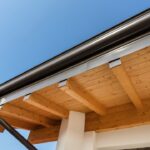Understanding Roof Decking and Its Necessity
When it comes to constructing or renovating a roof, one of the most important aspects to consider is roof decking. Homeowners often wonder, ‘what type of material is often applied on top of roof decking?’ This question is crucial as it determines the life span, durability, and effectiveness of the roof in guarding the home against various elements.
The roof decking forms the base upon which varies layers of roofing material are applied. A well-constructed, top-quality roof will not only protect from weather elements but also increase the home’s aesthetic appeal. Understanding the materials applied on top of decking is significant in making informed choices when upgrading or installing a new roof.

The Importance of Choosing the Right Roof Decking Material
Considering the vast array of roof decking materials available, making the right choice can be daunting yet tremendously rewarding. The material applied impacts the roof’s durability, longevity, and maintenance requirements. Proper knowledge and choice of material will save you from costly repairs and maintenance.
Exploring Common Materials
Several materials can be applied on top of roof decking. Here are some common options:
- Asphalt Shingles
- Metal Roofing
- Clay and Concrete Tiles
- Wood Shakes and Shingles
- Slate Roofing
- Synthetic Roofing
Comparing Longevity and Durability
Each material boasts unique characteristics in terms of longevity and durability:
- Asphalt Shingles: Affordable but require regular maintenance.
- Metal Roofing: Long-lasting with excellent resistance to weather.
- Clay and Concrete Tiles: Extremely durable but heavy.
- Wood Shakes: Natural appearance but susceptible to rot.
- Slate Roofing: Offers tremendous durability but at a high cost.
- Synthetic Roofing: Lightweight and durable.
Environmental Considerations
Environmental factors also influence the choice of roofing material. Living in a windy area may necessitate more robust materials like Metal Roofing, while regions prone to hail may benefit from the flexibility of Wood Shakes. Energy efficiency is another pivotal factor. Materials like Metal Roofing reflect more solar radiation, reducing cooling costs.
Cost Implications
Regarding roofing, cost implications are unavoidable. Materials like Asphalt Shingles are more affordable but might require frequent repairs and replacements, compared to Slate Roofing, which offers excellent durability but comes at a premium price. Homeowners must evaluate their budgets alongside material benefits.
Links to Cost Guides
For a comprehensive guide on how much different roofing options might cost, consider these helpful resources: Forbes Roofing Costs, and Roof Claim Cost Guide.
Installation and Maintenance
The installation process varies significantly across different materials, impacting both the time required and potential costs. Metal Roofing installation can be quicker, providing a tremendous advantage in urgent situations. On the other hand, Slate Roofing requires specialized labor and time.
Routine Maintenance
Maintenance plays a critical role in the lifespan and performance of roofing materials: regular inspections and cleaning preserve their integrity and effectiveness over time.
Tips for Effective Routine Maintenance
- Inspect the entire roof at least twice a year to spot damage early.
- Clear debris regularly to prevent blockage and damage.
- Engage professionals for thorough inspections if potential issues arise.
Choosing a Reliable Roofing Professional
Choosing a reliable professional to handle the installation or repair is vital for a successful roofing project. Experience, license, and customer reviews are excellent indicators of a professional’s reliability and service quality.
For a trusted roofing installation guide, visit: Choose a Roofing Company Wisely.

Conclusion
Understanding what type of material is often applied on top of roof decking can greatly influence your roofing decisions. From seeking sustainable options to ensuring durability and minimal maintenance, your choice can provide substantial benefits.
FAQ Section
What is the most durable roofing material?
Slate Roofing is known for its tremendous durability, often lasting well over 100 years with proper maintenance.
Can I switch roofing materials easily?
Switching materials may require structural assessment and potential reinforcement to support the new material’s weight and style.
What is the cheapest roofing material?
Asphalt Shingles remain the most affordable option but may incur higher long-term maintenance costs.
This article contains affiliate links. We may earn a commission at no extra cost to you.








